|
|
|
Sort Order |
|
|
|
Items / Page
|
|
|
|
|
|
|
| Srl | Item |
| 1 |
ID:
133161
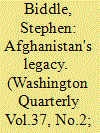

|
|
|
|
|
| Publication |
2014.
|
| Summary/Abstract |
The war in Afghanistan is not over. Nor is it ending any time soon. The U.S. role may end in 2016, in whole or in part, but the war will continue-and its ultimate outcome is very much in doubt. The conflict is now stalemated militarily, and will likely stay that way as long as outsiders pay the large bills needed to keep the Afghan National Security Forces (ANSF) in the field and fighting. The war will thus grind onward until this funding dries up or the two sides negotiate a compromise settlement, neither of which is imminent. Depending on how any talks unfold, historians in 2050 could thus look back on this war as a costly but tolerable outcome for the West, as a wasteful disaster, or as something in between; for now, all we know for sure is that it continues.
|
|
|
|
|
|
|
|
|
|
|
|
|
|
|
|
| 2 |
ID:
034567
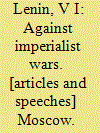

|
|
|
|
|
| Publication |
Moscow, Progress Publishers, 1966.
|
| Description |
376p.Hbk
|
|
|
|
|
|
|
|
|
|
|
|
Copies: C:1/I:0,R:0,Q:0
Circulation
| Accession# | Call# | Current Location | Status | Policy | Location |
| 032519 | 923.147/LEN 032519 | Main | On Shelf | General | |
|
|
|
|
| 3 |
ID:
002169
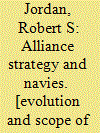

|
|
|
|
|
| Publication |
London, Pinter Publishers, 1990.
|
| Description |
xix,182p.
|
| Standard Number |
0861878418
|
|
|
|
|
|
|
|
|
|
|
|
Copies: C:1/I:0,R:0,Q:0
Circulation
| Accession# | Call# | Current Location | Status | Policy | Location |
| 033297 | 355.031/JOR 033297 | Main | On Shelf | General | |
|
|
|
|
| 4 |
ID:
029987
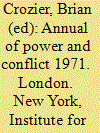

|
|
|
|
|
| Publication |
London, New York, 1972.
|
| Description |
vi, 141p.
|
|
|
|
|
|
|
|
|
|
|
|
Copies: C:1/I:0,R:0,Q:0
Circulation
| Accession# | Call# | Current Location | Status | Policy | Location |
| 012978 | 327.16/ANN 012978 | Main | On Shelf | General | |
|
|
|
|
| 5 |
ID:
068930


|
|
|
| 6 |
ID:
132327
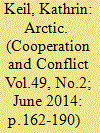

|
|
|
|
|
| Publication |
2014.
|
| Summary/Abstract |
Neorealist and neoliberal institutionalist explanations for the state and future of the Arctic region dominate the Arctic debate in international relations. While both schools focus on different aspects concerning the current and future state of Arctic affairs - neorealism evokes a confrontational rush for the Arctic's resources, whereas neoliberal institutionalism propagates the necessary reform of the institutional system governing Arctic issues - both share the underlying assumption of significant and rising stakes towards Arctic commodities. However, this article argues that this debate has hitherto failed to substantiate the actual stakes of the main actors involved. Consequently, many studies make grandiloquent statements about prospects of cooperation and conflict and the appropriate institutional framework for the Arctic region, based on only limited empirical support. This article aims to fill this gap by analysing the Arctic oil and gas interests of the five Arctic littoral states (Russia, USA, Canada, Norway and Denmark/Greenland). The analysis shows greatly different levels of interests towards the High North among the Arctic states. The findings make it possible to make more credible statements about the likelihood of confrontation over Arctic resources and necessary institutional adjustments. The evidence shows that the often-evoked issue of geopolitical rush for Arctic resources is unlikely to eventuate. Nonetheless, there remain institutional challenges for the protection of the fragile Arctic ecosystem.
|
|
|
|
|
|
|
|
|
|
|
|
|
|
|
|
| 7 |
ID:
077441
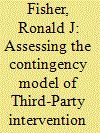

|
|
|
|
|
| Publication |
2007.
|
| Summary/Abstract |
The theory and practice of third-party intervention continue to develop in constructive directions and increasingly acknowledge the utility of unofficial methods directed more toward the subjective and relational aspects of international conflict. A previously developed contingency model of third-party intervention articulates the potential complementarity of these unofficial approaches (e.g. problem-solving workshops) with more traditional, official methods (e.g. power mediation) in pursuit of resolution. A comparative analysis of five cases of successful unofficial intervention in ethno-political conflicts identifies important contributions to the peace process. Descriptions of the interventions are followed by an identification of the transfer mechanisms and effects that carried the fruits of the unofficial interactions into the official domain. Each case is then reflected on the contingency model by identifying the stage of conflict escalation and the initiation, sequencing, and complementarity of interventions. The analysis provides some support for the validity of the model, although variations in the patterns of intervention indicate that strict applications of the model may be untenable. The model is thus seen as an idealized representation of a complex reality, but one that identifies some of the necessary interplay between official and unofficial interventions in order to effectively address intractable ethno-political conflicts.
|
|
|
|
|
|
|
|
|
|
|
|
|
|
|
|
| 8 |
ID:
052897
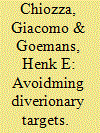

|
|
|
| 9 |
ID:
134209
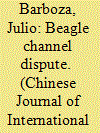

|
|
|
|
|
| Publication |
2014.
|
| Summary/Abstract |
The Beagle Channel dispute between Chile and Argentina presented great challenges to them. An award delivered by an arbitral tribunal did not manage to settle it. The crisis after the award brought the States to the brink of war. Only tenacious efforts by the Holy See to mediate between these two largely Catholic nations managed to calm tensions as well as a change in political climate allow the parties to finally settle the dispute. This paper describes and analyses the background to the dispute, the principles and arguments involved in the dispute, the decision of the Court of Arbitration, the crisis following the award, the papal mediation and the events that finally brought the dispute to an end. Some general comments will be offered in the last section.
|
|
|
|
|
|
|
|
|
|
|
|
|
|
|
|
| 10 |
ID:
175923
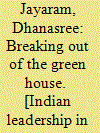

|
|
|
|
|
| Publication |
New Delhi, KW Publishers Pvt Ltd and CAPS, 2012.
|
| Description |
xxii, 235p.Hbk
|
| Standard Number |
9789381904138
|
|
|
|
|
|
|
|
|
|
|
|
Copies: C:1/I:0,R:0,Q:0
Circulation
| Accession# | Call# | Current Location | Status | Policy | Location |
| 059934 | 363.73874/JAY 059934 | Main | On Shelf | General | |
|
|
|
|
| 11 |
ID:
133855
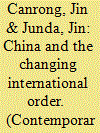

|
|
|
|
|
| Publication |
2014.
|
| Summary/Abstract |
From the beginning of 2014, the international order has undergone some quite dramatic changes in several parts of the world. The Ukrainian political crisis has gradually evolved into a U.S-Russia confrontation two decades after the end of cold war. In the Middle East, the extremist group, the Islamic State of Iraq and Al Sham (ISIS) invaded Iraq gaining much territory in the north of the country. Iraq has become a new unstable element in the Middle East. In Africa, the aftershock of the Arab Spring can be seen most prominently in Egypt and Libya. South Sudan and Central Africa are plagued by civil war. In the Asia-Pacific region Sino-Vietnam and Sino-Japanese Conflict have escalated and Japan has lifted a ban on collective self defence which threaten China's neighborhood security and regional stability.
|
|
|
|
|
|
|
|
|
|
|
|
|
|
|
|
| 12 |
ID:
105978
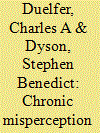

|
|
|
|
|
| Publication |
2011.
|
| Summary/Abstract |
Why did the United States and Iraq find themselves in full-scale conflict with each other in 1990-91 and 2003, and in almost constant low-level hostilities during the years in-between? The situation was neither inevitable nor one that either side, in full possession of all the relevant information about the other, would have purposely engineered: in short, a classic instance of chronic misperception. A combination of the psychological literature on perception and its pathologies with the almost unique firsthand access of one of the authors to the decisionmakers on both sides-the former deputy head of the United Nations weapons of mass destruction inspection mission in the 1990s, the author of the definitive postwar account of Iraqi WMD programs for which he and his team debriefed the top regime leadership, and a Washington insider in regular contact with all major foreign policy agencies of the U.S. government-reveals the perceptions the United States and Iraq held of each other, as well as the biases, mistakes, and intelligence failures of which these images were, at different points in time, both cause and effect.
|
|
|
|
|
|
|
|
|
|
|
|
|
|
|
|
| 13 |
ID:
065948
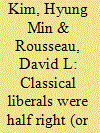

|
|
|
| 14 |
ID:
019374
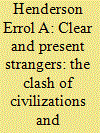

|
|
|
|
|
| Publication |
June 2001.
|
| Description |
317-338
|
|
|
|
|
|
|
|
|
|
|
|
|
|
|
|
| 15 |
ID:
005299
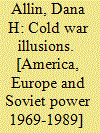

|
|
|
|
|
| Publication |
Houndmills, Macmillan, 1995.
|
| Description |
xv, 367p.
|
| Standard Number |
0333637763
|
|
|
|
|
|
|
|
|
|
|
|
Copies: C:1/I:0,R:0,Q:0
Circulation
| Accession# | Call# | Current Location | Status | Policy | Location |
| 036540 | 327.16/ALL 036540 | Main | On Shelf | General | |
|
|
|
|
| 16 |
ID:
133149
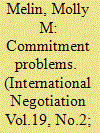

|
|
|
|
|
| Publication |
2014.
|
| Summary/Abstract |
Why do some militarized interstate disputes involve multiple third party attempts to resolve the dispute, while others seemingly end before movement towards peace is possible? This article examines third party commitment to international conflict resolution. I argue that a third party's commitment reflects strategic interests, barriers to entry and the conflict's prospects for peace, which encourage third party involvement while having a dampening effect on their commitment. I also explore the role of bias in management onset and third party commitment. Analysis of conflict management in militarized interstate disputes from 1946 to 2001 offers significant support for the hypotheses.
|
|
|
|
|
|
|
|
|
|
|
|
|
|
|
|
| 17 |
ID:
046551
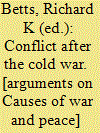

|
|
|
|
|
| Edition |
2nd ed.
|
| Publication |
New York, Longman, 2002.
|
| Description |
viii, 567p.
|
| Standard Number |
0321081706
|
|
|
|
|
|
|
|
|
|
|
|
Copies: C:1/I:0,R:0,Q:0
Circulation
| Accession# | Call# | Current Location | Status | Policy | Location |
| 045466 | 327.16/BET 045466 | Main | On Shelf | General | |
|
|
|
|
| 18 |
ID:
108736
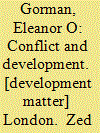

|
|
|
|
|
| Publication |
London, Zed Books, 2011.
|
| Description |
x, 179p.Pbk
|
| Standard Number |
9781848135758
|
|
|
|
|
|
|
|
|
|
|
|
Copies: C:1/I:0,R:0,Q:0
Circulation
| Accession# | Call# | Current Location | Status | Policy | Location |
| 056374 | 909.82/GOR 056374 | Main | On Shelf | General | |
|
|
|
|
| 19 |
ID:
096966
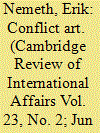

|
|
|
|
|
| Publication |
2010.
|
| Summary/Abstract |
Historically, empires recruited scholars to capture artworks as a complement to military victory. Over the past century, cultural scholars have integrated fine art and antiquities into campaigns of conquest and assessed the political ramifications of damage to historic sites and religious monuments in military intervention. Consequently, historians, archaeologists and legal scholars have advanced the role of cultural patrimony in international conflict from a rite of conquest to a means of combat. In World War II, art historians in the Nazi regime planned plunder of artworks and destruction of historic structures as a tactic for conquest. During the Cold War, archaeological discoveries in developing nations enabled looting of cultural artifacts, and subsequent legal studies on the transfer of cultural property developed the value of cultural patrimony in the covert battle for control of the Third World. Since the Cold War, as transnational organized crime and terrorism exploit antiquities trafficking and target cultural sites in acts of political violence, scholars in international relations have considered culture in security theories. Across the three periods of international conflict, cultural scholars have actively developed the tactical value of cultural patrimony and played a role in transforming the perception of plunder in the context of military victory.
|
|
|
|
|
|
|
|
|
|
|
|
|
|
|
|
| 20 |
ID:
004993
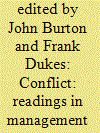

|
|
|
|
|
| Publication |
Houndmills, Macmillan, 1993.
|
| Description |
xxiv,354p.;figures
|
| Standard Number |
0-333-52145-5
|
|
|
|
|
|
|
|
|
|
|
|
Copies: C:1/I:0,R:0,Q:0
Circulation
| Accession# | Call# | Current Location | Status | Policy | Location |
| 036075 | 303.6/BUR 036075 | Main | On Shelf | General | |
|
|
|
|
|
|
|
|
|